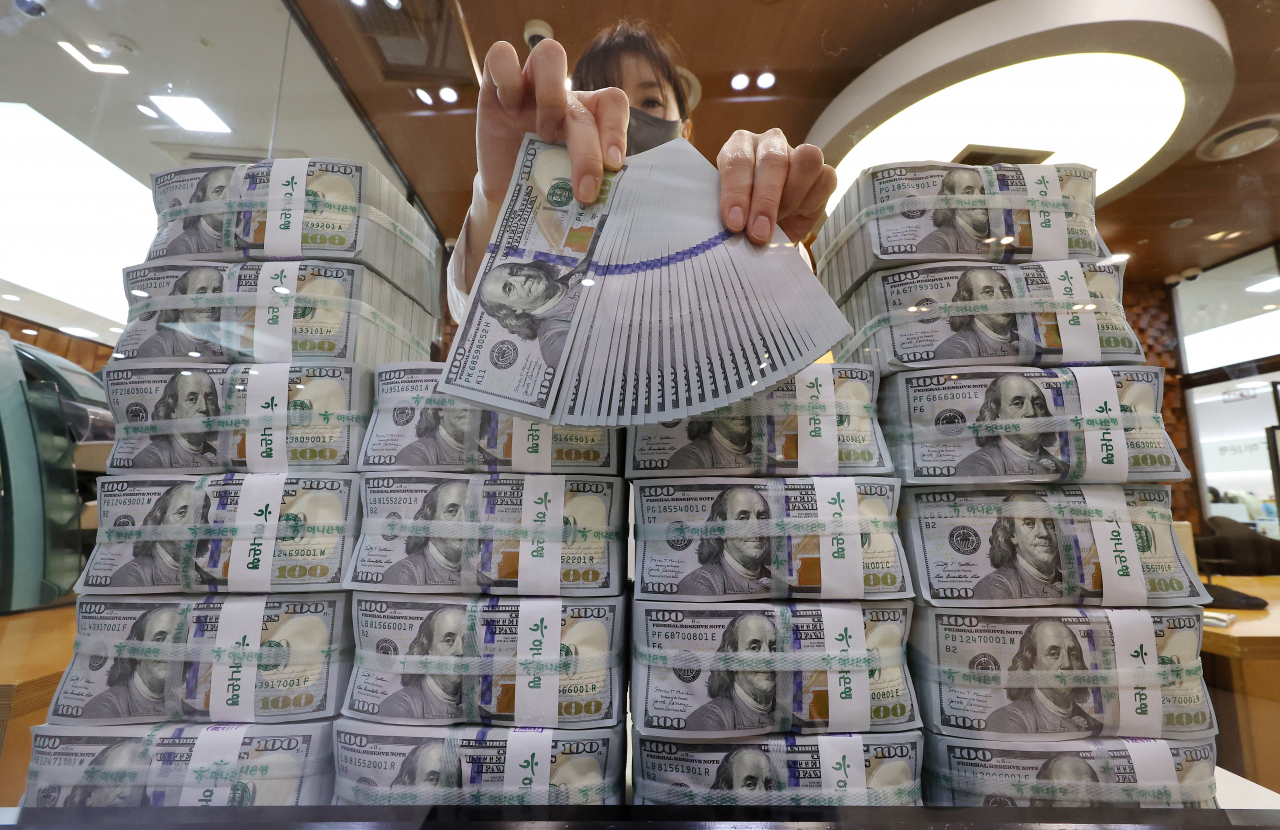Foreign reserves rebound, riding out strong US dollar
By Im Eun-byelPublished : April 3, 2024 - 15:53

South Korea's foreign exchange reserves rebounded in March after a two-month decline, backed by deposits and investment gains offsetting the strong US dollar, the central bank said Wednesday.
The country's foreign reserves had come to $419.25 billion as of late March, up $3.51 billion from the previous month, according to the data from the Bank of Korea.
The figure advanced on-month after declining for the first two months of the year. It moved down $4.4 billion and $20 million in January and February, respectively, as the US dollar gained value.
The strengthening of the US greenback results in a depreciation of other currencies held by the central bank, bringing down the overall international reserves for Korea.
But in March, foreign reserves turned to an expansion, despite the resilient dollar, as the losses were balanced out by other factors.
"Though the strong US dollar brought down the converted value of holdings denominated in other currencies, gains from investment and deposits offset the decrease and raised the amount held by the overall reserve,” the central bank explained.
Foreign securities stood at $364.89 billion in March, up $4.63 billion on-month. The securities, comprising US Treasurys, government agencies and corporate bonds, account for 87 percent of the total reserves, taking up the largest portion.
Deposits worth $30.5 billion were held by the central bank in the same month, up $8.73 billion on-month, accounting for 8.7 percent.
The rest of the foreign reserve consists of special drawing rights of $14.7 billion (3.5 percent), gold worth $4.8 billion (1.1 percent) and the country’s claims related to the International Monetary Fund at $4.3 billion (1 percent).
In late February, Korea ranked as the world's ninth-largest holder of foreign reserves with its reserve amounting to $415.7 billion at the time.
China was the country with the largest foreign reserve in the world at $3.28 trillion, followed by Japan at $1.28 trillion, Switzerland at $854.4 billion, India at $625.2 billion, Russia at $582.6 billion, Taiwan at $569.4 billion, Saudi Arabia at $431.7 billion and Hong Kong at $425.2 billion. Korea was followed by Singapore at $357.3 billion.
The greenback continues to remain strong this year, backed by the resilient US economy. Strong economic data suggests the US Federal Reserve is unlikely to cut the key interest rate soon, bringing down the preference for higher-risk assets, including the Korean won.
The US dollar index, a metric of the dollar value against major six peers such as the euro, pound and yen, rose 0.5 percent in March, the central bank said. The rise indicates that the value of the US currency relatively strengthened.
Other key currencies devalued. The euro index dropped by 0.5 percent, while the pound index and yen index decreased by 0.3 percent and 0.5 percent, respectively, in the cited period.
With the strong US currency, the Korean won weakened. The won-dollar exchange rate broke its yearly high on Tuesday as it closed at 1,352.1 won after peaking at 1,355.9 won during trading. It was the first time in five months that the rate moved above 1,350 won.
The dollar slightly devalued on Wednesday. The exchange rate closed at 1,348.9 won, with the local currency strengthening 3.2 won from the previous day.





![[Grace Kao] Hybe vs. Ador: Inspiration, imitation and plagiarism](http://res.heraldm.com/phpwas/restmb_idxmake.php?idx=644&simg=/content/image/2024/04/28/20240428050220_0.jpg&u=)
![[Herald Interview] Mom’s Touch seeks to replicate success in Japan](http://res.heraldm.com/phpwas/restmb_idxmake.php?idx=644&simg=/content/image/2024/04/29/20240429050568_0.jpg&u=)


![[News Focus] Lee tells Yoon that he has governed without political dialogue](http://res.heraldm.com/phpwas/restmb_idxmake.php?idx=644&simg=/content/image/2024/04/29/20240429050696_0.jpg&u=20240429210658)









![[Today’s K-pop] Seventeen sets sales record with best-of album](http://res.heraldm.com/phpwas/restmb_idxmake.php?idx=642&simg=/content/image/2024/04/30/20240430050818_0.jpg&u=)